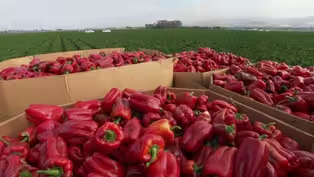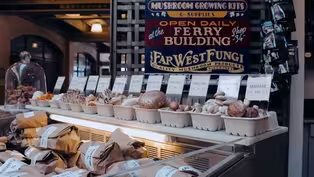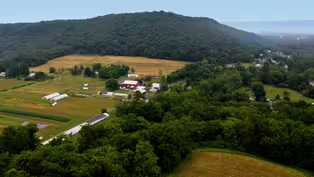
Sustainable Agriculture in Pennsylvania
Clip: 6/30/2023 | 5mVideo has Closed Captions
Meet the women who own a rural farm in Pennsylvania.
Meet the women who own a rural farm in Pennsylvania that’s a leader in organic and sustainable agriculture.
Problems playing video? | Closed Captioning Feedback
Problems playing video? | Closed Captioning Feedback
America's Heartland is presented by your local public television station.
Funding for America’s Heartland is provided by US Soy, Sustainable Agriculture Research and Education, Rural Development Partners, and a Specialty Crop Grant from the California Department of Food and Agriculture.

Sustainable Agriculture in Pennsylvania
Clip: 6/30/2023 | 5mVideo has Closed Captions
Meet the women who own a rural farm in Pennsylvania that’s a leader in organic and sustainable agriculture.
Problems playing video? | Closed Captioning Feedback
How to Watch America's Heartland
America's Heartland is available to stream on pbs.org and the free PBS App, available on iPhone, Apple TV, Android TV, Android smartphones, Amazon Fire TV, Amazon Fire Tablet, Roku, Samsung Smart TV, and Vizio.
Providing Support for PBS.org
Learn Moreabout PBS online sponsorship♪♪ [Debra Brubaker] From a very early age, I was working in the fields with my parents.
My dad grew up on a farm about eight miles from here, and his father was an organic farmer.
My grandfather kind of stayed true to organic practices and very much influenced my dad in that way.
Everywhere you look, you'll see the influence of Debra's father and grandfather on these 75 acres of land.
It's called Village Acres Farm, and it's known in central Pennsylvania for being a leader in sustainability.
Today, the farm is run by Debra Brubaker and her wife, Hannah Smith-Brubaker.
Debra's sisters, Phoebe and Angela Brubaker, also run a commercial flower business on the farm, making this a true family affair.
[Debra] We have crop land- about five to seven acres of... of vegetable crops- as well as, uh, doing pastured livestock.
[Hannah] We grow about 50 different varieties of vegetables, um, and the breed of sheep that we raise is Shetland, which is traditionally from Scotland.
They do a really good job in everything from weed control to returning nutrients to the soil.
In the early days, Village Acres Farm was a place where customers could pick their own berries.
At other times, the farm offered Community Supported Agriculture, or CSA, boxes.
Today, they mostly sell their produce at local restaurants.
Debra says she and her siblings were raised by parents who believed that farming was a higher calling.
[Debra] I think it's the fusion of my dad's real interest in farming with my mom's love of birds, flowers, everything, to really kind of create a property that really looks out for... for both food for humans, as well as... as the natural environment.
[Phoebe] We know that mom and dad really wanted it to be a place that fed other people, not just food, but also valuable relationships.
And so, we've been sort of, um, looking at how flowers are integrated.
The flowers bring in a new income stream, and just as important, they're good for the crops.
[Hannah] So, we've added a lot of flowers to our farm, which is great because that's a great enterprise, but at the heart of it, we can grow better vegetables attracting the bees.
The family has made other changes to increase sustainability on the land.
They planted 3,000 native trees, creating a buffer along the creek.
That buffer prevents soil from washing into the creek when it rains.
[Hannah] We want that soil to stay in the fields.
And so, we've been working with farmers, um, for a couple of years now to establish trees along the creek on their farms, so that it's cleaner water when it comes our way to our farm.
[Debra] So, these are the paprika peppers, two different varieties.
[Hannah] For true sustainability, we focus on three areas: people, planet and production or profitability.
When it comes to people, we want to make sure that we have a good quality of life here on our farm and that we're also economically supporting our local community.
In terms of the earth, we want to make sure that we can continue to grow food well into the future.
So, we want to pay attention to things like soil health and water quality.
And then, profitability or production.
Well, in order to make it as farmers, we have to be profitable.
While Village Acres Farm is notable for its sustainability practices, they say there's something else that sets them apart.
[Debra] Well, honestly, I think what's probably makes us most notable is that we're a bunch of women on this farm.
So, right now, all- my mother, the three of my siblings, my partner, who's also a woman, um, is... is sort of what identifies us to the... to the larger community.
[Hannah] In the end, we're really a united force.
We know that we want to feed people, that we want to create a beautiful and ecologically sound environment.
And that takes all of us.
♪♪ Pennsylvania ranks third in the nation when it comes to organic product sales.
The state is consistently in the top five states for organic mushrooms, eggs, turkeys and dairy cows.
That's contributed more than $1 billion to Pennsylvania's economy, with demand only increasing, fueled in part by the state's close proximity to major markets like Philadelphia, New York and Washington, D.C.
Video has Closed Captions
Clip: 6/30/2023 | 6m 20s | Visit a bustling farm in California’s Central Valley as they harvest bell peppers. (6m 20s)
Video has Closed Captions
Clip: 6/30/2023 | 6m 2s | A mushroom farm near Monterey Bay grows unique varieties. (6m 2s)
Video has Closed Captions
Preview: 6/30/2023 | 30s | Get ready for an all-new season of America’s Heartland premiering July 1! (30s)
Wild Mushroom Galette – Farm to Fork with Sharon Profis
Video has Closed Captions
Clip: 6/30/2023 | 5m 33s | Discover how to prepare a Wild Mushroom Galette with chimichurri sauce. (5m 33s)
Providing Support for PBS.org
Learn Moreabout PBS online sponsorshipSupport for PBS provided by:
America's Heartland is presented by your local public television station.
Funding for America’s Heartland is provided by US Soy, Sustainable Agriculture Research and Education, Rural Development Partners, and a Specialty Crop Grant from the California Department of Food and Agriculture.



















